- Home
- Nicholas Sparks
The Notebook Page 2
The Notebook Read online
Page 2
He'd come to regard Gus as family. There really wasn't anyone else, at least not since his father died last year. He was an only child; his mother had died of influenza when he was two, and though he had wanted to at one time, he had never married.
But he had been in love once, that he knew. Once and only once, and a long time ago. And it had changed him forever. Perfect love did that to a person, and this had been perfect.
Coastal clouds slowly began to roll across the evening sky, turning silver with the reflection of the moon. As they thickened, he leaned his head back and rested it against the rocking chair. His legs moved automatically, keeping a steady rhythm, and as he did most evenings, he felt his mind drifting back to a warm evening like this fourteen years ago.
It was just after graduation 1932, the opening night of the Neuse River Festival. The town was out in full, enjoying barbecue and games of chance. It was humid that night--for some reason he remembered that clearly. He arrived alone, and as he strolled through the crowd, looking for friends, he saw Fin and Sarah, two people he'd grown up with, talking to a girl he'd never seen before. She was pretty, he remembered thinking, and when he finally joined them, she looked his way with a pair of hazy eyes that kept on coming. "Hi," she'd said simply as she offered her hand, "Finley's told me a lot about you."
An ordinary beginning, something that would have been forgotten had it been anyone but her. But as he shook her hand and met those striking emerald eyes, he knew before he'd taken his next breath that she was the one he could spend the rest of his life looking for but never find again. She seemed that good, that perfect, while a summer wind blew through the trees.
From there, it went like a tornado wind. Fin told him she was spending the summer in New Bern with her family because her father worked for R. J. Reynolds, and though he only nodded, the way she was looking at him made his silence seem okay. Fin laughed then, because he knew what was happening, and Sarah suggested they get some cherry Cokes, and the four of them stayed at the festival until the crowds were thin and everything closed up for the night.
They met the following day, and the day after that, and they soon became inseparable. Every morning but Sunday when he had to go to church, he would finish his chores as quickly as possible, then make a straight line to Fort Totten Park, where she'd be waiting for him. Because she was a newcomer and hadn't spent time in a small town before, they spent their days doing things that were completely new to her. He taught her how to bait a line and fish the shallows for largemouth bass and took her exploring through the backwoods of the Croatan Forest. They rode in canoes and watched summer thunderstorms, and to him it seemed as though they'd always known each other.
But he learned things as well. At the town dance in the tobacco barn, it was she who taught him how to waltz and do the Charleston, and though they stumbled through the first few songs, her patience with him eventually paid off, and they danced together until the music ended. He walked her home afterward, and when they paused on the porch after saying good night, he kissed her for the first time and wondered why he had waited as long as he had. Later in the summer he brought her to this house, looked past the decay, and told her that one day he was going to own it and fix it up. They spent hours together talking about their dreams--his of seeing the world, hers of being an artist--and on a humid night in August, they both lost their virginity. When she left three weeks later, she took a piece of him and the rest of summer with her. He watched her leave town on an early rainy morning, watched through eyes that hadn't slept the night before, then went home and packed a bag. He spent the next week alone on Harkers Island.
Noah ran his hands through his hair and checked his watch. Eight-twelve. He got up and walked to the front of the house and looked up the road. Gus wasn't in sight, and Noah figured he wouldn't be coming. He went back to his rocker and sat again.
He remembered talking to Gus about her. The first time he mentioned her, Gus started to shake his head and laugh. "So that's the ghost you been running from." When asked what he meant, Gus said, "You know, the ghost, the memory. I been watchin' you, workin' day and night, slavin' so hard you barely have time to catch your breath. People do that for three reasons. Either they crazy, or stupid, or tryin' to forget. And with you, I knew you was tryin' to forget. I just didn't know what."
He thought about what Gus had said. Gus was right, of course. New Bern was haunted now. Haunted by the ghost of her memory. He saw her in Fort Totten Park, their place, every time he walked by. Either sitting on the bench or standing by the gate, always smiling, blond hair softly touching her shoulders, her eyes the color of emeralds. When he sat on the porch at night with his guitar, he saw her beside him, listening quietly as he played the music of his childhood.
He felt the same when he went to Gaston's Drug Store, or to the Masonic theater, or even when he strolled downtown. Everywhere he looked, he saw her image, saw things that brought her back to life.
It was odd, he knew that. He had grown up in New Bern. Spent his first seventeen years here. But when he thought about New Bern, he seemed to remember only the last summer, the summer they were together. Other memories were simply fragments, pieces here and there of growing up, and few, if any, evoked any feeling.
He had told Gus about it one night, and not only had Gus understood, but he had been the first to explain why. He said simply, "My daddy used to tell me that the first time you fall in love, it changes your life forever, and no matter how hard you try, the feelin' never goes away. This girl you been tellin' me about was your first love. And no matter what you do, she'll stay with you forever."
Noah shook his head, and when her image began to fade, he returned to Whitman. He read for an hour, looking up every now and then to see raccoons and possums scurrying near the creek. At nine-thirty he closed the book, went upstairs to the bedroom, and wrote in his journal, including both personal observations and the work he'd accomplished on the house. Forty minutes later, he was sleeping. Clem wandered up the stairs, sniffed him as he slept, and then paced in circles before finally curling up at the foot of his bed.
Earlier that evening and a hundred miles away, she sat alone on the porch swing of her parents' home, one leg crossed beneath her. The seat had been slightly damp when she sat down; rain had fallen earlier, hard and stinging, but the clouds were fading now and she looked past them, toward the stars, wondering if she'd made the right decision. She'd struggled with it for days--and had struggled some more this evening--but in the end, she knew she would never forgive herself if she let the opportunity slip away.
Lon didn't know the real reason she left the following morning. The week before, she'd hinted to him that she might want to visit some antique shops near the coast. "It's just a couple of days," she said, "and besides, I need a break from planning the wedding." She felt bad about the lie but knew there was no way she could tell him the truth. Her leaving had nothing to do with him, and it wouldn't be fair of her to ask him to understand.
It was an easy drive from Raleigh, slightly more than two hours, and she arrived a little before eleven. She checked into a small inn downtown, went to her room, and unpacked her suitcase, hanging her dresses in the closet and putting everything else in the drawers. She had a quick lunch, asked the waitress for directions to the nearest antique stores, then spent the next few hours shopping. By four-thirty she was back in her room.
She sat on the edge of the bed, picked up the phone, and called Lon. He couldn't speak long, he was due in court, but before they hung up she gave him the phone number where she was staying and promised to call the following day. Good, she thought while hanging up the phone. Routine conversation, nothing out of the ordinary. Nothing to make him suspicious.
She'd known him almost four years now; it was 1942 when they met, the world at war and America one year in. Everyone was doing their part, and she was volunteering at the hospital downtown. She was both needed and appreciated there, but it was more difficult than she'd expected. The first waves of wo
unded young soldiers were coming home, and she spent her days with broken men and shattered bodies. When Lon, with all his easy charm, introduced himself at a Christmas party, she saw in him exactly what she needed: someone with confidence about the future and a sense of humor that drove all her fears away.
He was handsome, intelligent, and driven, a successful lawyer eight years older than she, and he pursued his job with passion, not only winning cases, but also making a name for himself. She understood his vigorous pursuit of success, for her father and most of the men she met in her social circle were the same way. Like them, he'd been raised that way, and in the caste system of the South, family name and accomplishments were often the most important consideration in marriage. In some cases, they were the only consideration.
Though she had quietly rebelled against this idea since childhood and had dated a few men best described as reckless, she found herself drawn to Lon's easy ways and had gradually come to love him. Despite the long hours he worked, he was good to her. He was a gentleman, both mature and responsible, and during those terrible periods of the war when she needed someone to hold her, he never once turned her away. She felt secure with him and knew he loved her as well, and that was why she had accepted his proposal.
Thinking these things made her feel guilty about being here, and she knew she should pack her things and leave before she changed her mind. She had done it once before, long ago, and if she left now, she was sure she would never have the strength to return here again. She picked up her pocketbook, hesitated, and almost made it to the door. But coincidence had pushed her here, and she put the pocketbook down, again realizing that if she quit now, she would always wonder what would have happened. And she didn't think she could live with that.
She went to the bathroom and started a bath. After checking the temperature, she walked to the dresser, taking off her gold earrings as she crossed the room. She found her makeup bag, opened it, and pulled out a razor and a bar of soap, then undressed in front of the bureau.
She had been called beautiful since she was a young girl, and once she was naked, she looked at herself in the mirror. Her body was firm and well proportioned, breasts softly rounded, stomach flat, legs slim. She'd inherited her mother's high cheekbones, smooth skin, and blond hair, but her best feature was her own. She had "eyes like ocean waves," as Lon liked to say.
Taking the razor and soap, she went to the bathroom again, turned off the faucet, set a towel where she could reach it, and stepped in gingerly.
She liked the way a bath relaxed her, and she slipped lower in the water. The day had been long and her back was tense, but she was pleased she had finished shopping so quickly. She had to go back to Raleigh with something tangible, and the things she had picked out would work fine. She made a mental note to find the names of some other stores in the Beaufort area, then suddenly doubted she would need to. Lon wasn't the type to check up on her.
She reached for the soap, lathered up, and began to shave her legs. As she did, she thought about her parents and what they would think of her behavior. No doubt they would disapprove, especially her mother. Her mother had never really accepted what had happened the summer they'd spent here and wouldn't accept it now, no matter what reason she gave.
She soaked a while longer in the tub before finally getting out and toweling off. She went to the closet and looked for a dress, finally choosing a long yellow one that dipped slightly in the front, the kind of dress that was common in the South. She slipped it on and looked in the mirror, turning from side to side. It fit her well and made her look feminine, but she eventually decided against it and put it back on the hanger.
Instead she found a more casual, less revealing dress and put that on. Light blue with a touch of lace, it buttoned up the front, and though it didn't look quite as nice as the first one, it conveyed an image she thought would be more appropriate.
She wore little makeup, just a touch of eye shadow and mascara to accent her eyes. Perfume next, not too much. She found a pair of small-hooped earrings, put those on, then slipped on the tan, low-heeled sandals she had been wearing earlier. She brushed her blond hair, pinned it up, and looked in the mirror. No, it was too much, she thought, and she let it back down. Better.
When she was finished she stepped back and evaluated herself. She looked good: not too dressy, not too casual. She didn't want to overdo it. After all, she didn't know what to expect. It had been a long time--probably too long--and many different things could have happened, even things she didn't want to consider.
She looked down and saw her hands were shaking, and she laughed to herself. It was strange; she wasn't normally this nervous. Like Lon, she had always been confident, even as a child. She remembered that it had been a problem at times, especially when she dated, because it had intimidated most of the boys her age.
She found her pocketbook and car keys, then picked up the room key. She turned it over in her hand a couple of times, thinking, You've come this far, don't give up now, and almost left then, but instead sat on the bed again. She checked her watch. Almost six o'clock. She knew she had to leave in a few minutes--she didn't want to arrive after dark, but she needed a little more time.
"Damn," she whispered, "what am I doing here? I shouldn't be here. There's no reason for it," but once she said it she knew it wasn't true. There was something here. If nothing else, she would have her answer.
She opened her pocketbook and thumbed through it until she came to a folded-up piece of newspaper. After taking it out slowly, almost reverently, being careful not to rip it, she unfolded it and stared at it for a while. "This is why," she finally said to herself, "this is what it's all about."
Noah got up at five and kayaked for an hour up Brices Creek, as he usually did. When he finished, he changed into his work clothes, warmed some biscuits from the day before, grabbed a couple of apples, and washed his breakfast down with two cups of coffee.
He worked on the fencing again, repairing most of the posts that needed it. It was Indian summer, the temperature over eighty degrees, and by lunchtime he was hot and tired and glad for the break.
He ate at the creek because the mullets were jumping. He liked to watch them jump three or four times and glide through the air before vanishing into the brackish water. For some reason he had always been pleased by the fact that their instinct hadn't changed for thousands, maybe tens of thousands, of years.
Sometimes he wondered if man's instincts had changed in that time and always concluded that they hadn't. At least in the basic, most primal ways. As far as he could tell, man had always been aggressive, always striving to dominate, trying to control the world and everything in it. The war in Europe and Japan proved that.
He quit working a little after three and walked to a small shed that sat near his dock. He went in, found his fishing pole, a couple of lures, and some live crickets he kept on hand, then walked out to the dock, baited his hook, and cast his line.
Fishing always made him reflect on his life, and he did it now. After his mother died, he could remember spending his days in a dozen different homes, and for one reason or another, he stuttered badly as a child and was teased for it. He began to speak less and less, and by the age of five, he wouldn't speak at all. When he started classes, his teachers thought he was retarded and recommended that he be pulled out of school.
Instead, his father took matters into his own hands. He kept him in school and afterward made him come to the lumberyard, where he worked, to haul and stack wood. "It's good that we spend some time together," he would say as they worked side by side, "just like my daddy and I did."
During their time together, his father would talk about birds and animals or tell stories and legends common to North Carolina. Within a few months Noah was speaking again, though not well, and his father decided to teach him to read with books of poetry. "Learn to read this aloud and you'll be able to say anything you want to." His father had been right again, and by the following year, Noah had lost his stutter.
But he continued to go to the lumberyard every day simply because his father was there, and in the evenings he would read the works of Whitman and Tennyson aloud as his father rocked beside him. He had been reading poetry ever since.
When he got a little older, he spent most of his weekends and vacations alone. He explored the Croatan Forest in his first canoe, following Brices Creek for twenty miles until he could go no farther, then hiked the remaining miles to the coast. Camping and exploring became his passion, and he spent hours in the forest, sitting beneath blackjack oak trees, whistling quietly, and playing his guitar for beavers and geese and wild blue herons. Poets knew that isolation in nature, far from people and things man-made, was good for the soul, and he'd always identified with poets.
Although he was quiet, years of heavy lifting at the lumberyard helped him excel in sports, and his athletic success led to popularity. He enjoyed the football games and track meets, and though most of his team-mates spent their free time together as well, he rarely joined them. An occasional person found him arrogant; most simply figured he had grown up a bit faster than everyone else. He had a few girlfriends in school, but none had ever made an impression on him. Except for one. And she came after graduation.
Allie. His Allie.
He remembered talking to Fin about Allie after they'd left the festival that first night, and Fin had laughed. Then he'd made two predictions: first, that they would fall in love, and second, that it wouldn't work out.
There was a slight tug at his line and Noah hoped for a largemouth bass, but the tugging eventually stopped, and after reeling his line in and checking the bait, he cast again.
Fin ended up being right on both counts. Most of the summer, she had to make excuses to her parents whenever they wanted to see each other. It wasn't that they didn't like him--it was that he was from a different class, too poor, and they would never approve if their daughter became serious with someone like him. "I don't care what my parents think, I love you and always will," she would say. "We'll find a way to be together."

 The Notebook
The Notebook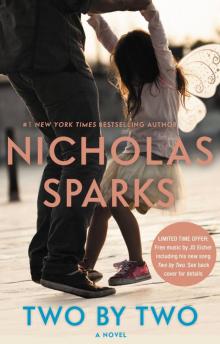 Two by Two
Two by Two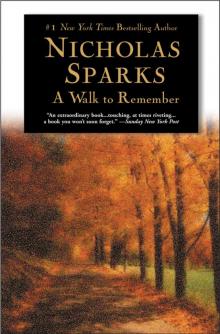 A Walk to Remember
A Walk to Remember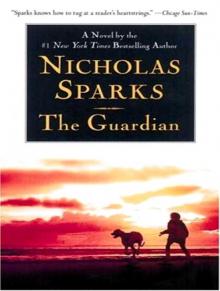 The Guardian
The Guardian Dear John
Dear John The Last Song
The Last Song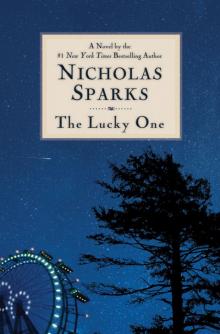 The Lucky One
The Lucky One The Wedding
The Wedding The Longest Ride
The Longest Ride Safe Haven
Safe Haven The Rescue
The Rescue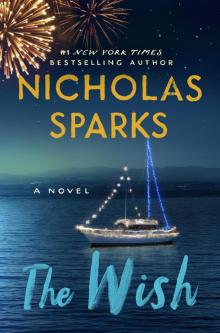 The Wish
The Wish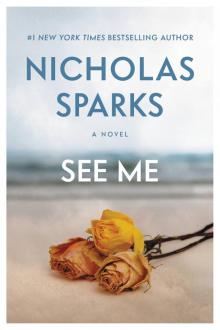 See Me
See Me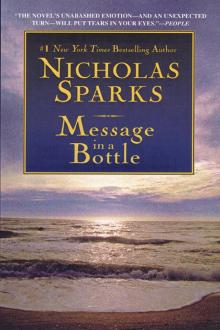 Message in a Bottle
Message in a Bottle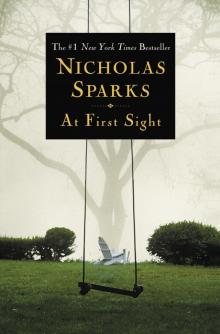 At First Sight
At First Sight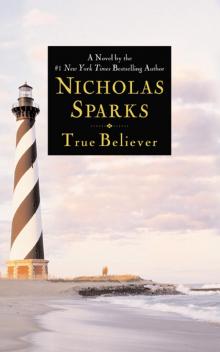 True Believer
True Believer The Return
The Return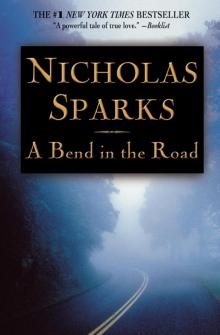 A Bend in the Road
A Bend in the Road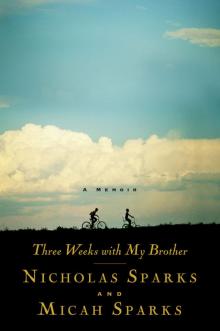 Three Weeks With My Brother
Three Weeks With My Brother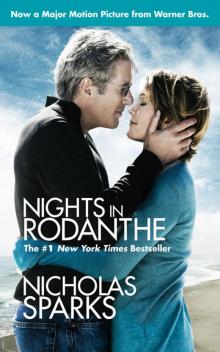 Nights in Rodanthe
Nights in Rodanthe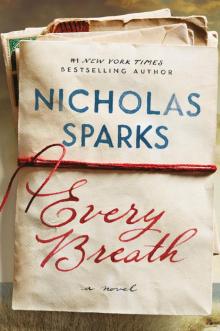 Every Breath
Every Breath